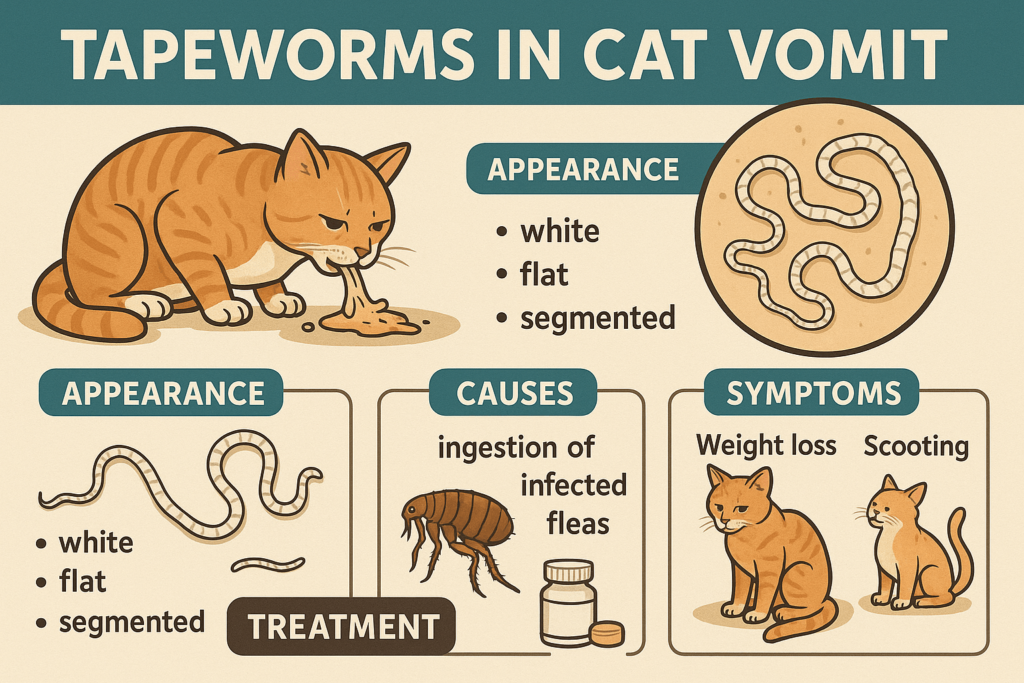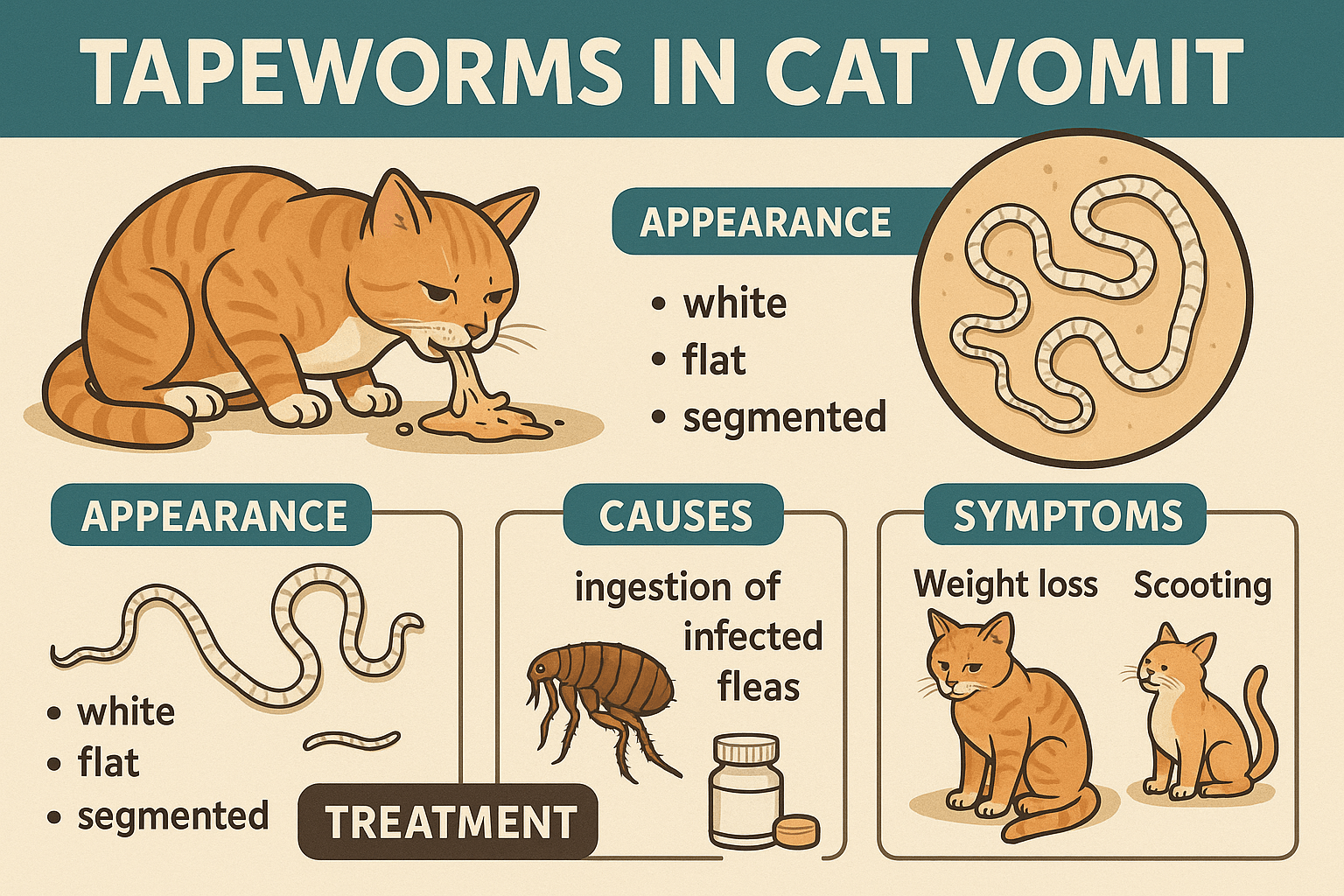Tapeworms in Cat Vomit: What You Need to Know
Discovering tapeworms in your cat’s vomit can be alarming, but understanding this issue is the first step toward addressing it effectively. Tapeworms are a common intestinal parasite that can affect cats, often hitching a ride into their digestive system through fleas or contaminated prey. While seeing these wriggling segments in your cat’s vomit may seem unsettling, it’s a clear sign that your pet needs prompt attention. This blog post will explore the causes, symptoms, and treatment options for tapeworms, as well as how to prevent future infestations. By the end, you’ll feel equipped to handle this unpleasant but manageable health concern for your feline companion.
Expert Insight on Cat Tapeworms
“The most common cat tapeworm is Dipylidium caninum. Cats get these tapeworms when they eat fleas containing immature forms of the parasite, usually when they are self-grooming in an attempt to rid themselves of fleas.”
Signs Your Cat May Have Tapeworms
Recognizing the signs of a tapeworm infestation early can help you address the issue before it worsens. Here are some common symptoms to watch for:
Visible Worm Segments:
Tapeworms shed small, rice-like segments that may appear in your cat’s vomit, feces, or around their anus.Excessive Licking or Biting at the Rear End:
Cats with tapeworms often experience itching or irritation around their anal area, leading them to lick or bite excessively.Weight Loss Despite Normal Eating Habits:
Tapeworms absorb nutrients from your cat’s food, which can lead to unexplained weight loss even if they’re eating normally.Vomiting or Regurgitation:
Some cats may vomit as a result of gastrointestinal discomfort caused by tapeworms, sometimes expelling visible worm segments.Dull Coat or Poor Skin Condition:
Nutrient deficiencies from tapeworms can manifest as a lackluster coat or dry, flaky skin.
If you notice any of these symptoms, it’s important to consult your veterinarian promptly to confirm the diagnosis and begin treatment.

How Tapeworms Infect Cats
Tapeworms don’t just appear out of nowhere—they have specific ways of infecting cats. Understanding these transmission methods can help you take preventive measures.
Flea Infestations:
Fleas are the most common carriers of tapeworm larvae. If your cat ingests an infected flea while grooming, they can contract tapeworms.Hunting Behavior:
Outdoor cats that hunt rodents or birds may ingest tapeworm larvae present in their prey.Contaminated Environments:
Cats exposed to areas where infected animals or fleas have been can inadvertently pick up tapeworm eggs.Shared Litter Boxes:
In multi-cat households, shared litter boxes can facilitate the spread of tapeworm eggs if proper hygiene isn’t maintained.Poor Grooming Practices:
Cats that groom excessively in flea-infested environments are more likely to ingest fleas carrying tapeworm larvae.
By addressing these risk factors, you can significantly reduce the chances of your cat contracting tapeworms.
Check this guide 👉Rice Tapeworms in Cats: Best 7 Expert Tips!
Check this guide 👉Why Does My Cat Vomit After Pooping? Best 7 Expert Tips!
Check this guide 👉Diabetic Cat Vomiting: Best 7 Health Tips!
Preventing Tapeworms in Cats | Treating Tapeworm Infestations |
|---|---|
Regular flea control treatments | Deworming medications prescribed by vets |
Keeping cats indoors to avoid hunting | Cleaning up vomit and feces promptly |
Maintaining a clean living environment | Monitoring for recurring symptoms |
Washing bedding and toys frequently | Scheduling follow-up vet visits |
Avoiding contact with stray animals | Ensuring all pets in the home are treated |
Steps to Treat Tapeworms in Cats
If your cat has been diagnosed with tapeworms, prompt treatment is essential to restore their health and comfort. Follow these steps to address the infestation effectively.
Consult Your Veterinarian:
A vet can confirm the presence of tapeworms and prescribe the appropriate deworming medication for your cat.Administer Medication Properly:
Follow the vet’s instructions carefully when giving oral or topical treatments to ensure complete eradication of the parasites.Treat Flea Infestations Simultaneously:
Since fleas are a primary source of tapeworms, treating your cat and their environment for fleas is crucial to prevent reinfestation.Clean Your Home Thoroughly:
Wash bedding, vacuum carpets, and disinfect surfaces to eliminate any lingering tapeworm eggs or flea larvae.Monitor Your Cat’s Recovery:
Keep an eye on your cat’s behavior and physical condition to ensure the treatment is working and no symptoms persist.
With consistent care and attention, your cat can recover fully from a tapeworm infestation.
Tips for Preventing Future Tapeworm Infestations
Prevention is always better than cure when it comes to tapeworms. These tips can help you safeguard your cat’s health and keep tapeworms at bay.
Use Monthly Flea Prevention Products:
Consistent use of vet-recommended flea treatments can protect your cat from fleas that carry tapeworm larvae.Supervise Outdoor Activities:
Limit your cat’s exposure to potential sources of infection, such as rodents or contaminated environments.Practice Good Hygiene:
Regularly clean litter boxes, food bowls, and sleeping areas to minimize the risk of parasite transmission.Schedule Routine Vet Checkups:
Regular veterinary exams can help detect and address parasitic infections early before they become severe.Educate Yourself About Parasites:
Understanding how tapeworms and other parasites spread empowers you to take proactive steps in protecting your cat.
By implementing these preventive measures, you can create a safer and healthier environment for your feline friend.
Common Misconceptions About Tapeworms
Misinformation about tapeworms can lead to confusion and ineffective treatment. Clearing up these misconceptions helps ensure proper care for your cat.
Myth: Tapeworms Are Rare in Cats:
Tapeworms are actually quite common, especially in cats exposed to fleas or outdoor environments.Myth: Vomiting Is the Only Symptom:
While vomiting may occur, other signs like weight loss or visible worm segments are equally important indicators.Myth: Over-the-Counter Treatments Always Work:
Not all OTC products are effective against tapeworms, and improper use can delay proper treatment.Myth: Indoor Cats Can’t Get Tapeworms:
Even indoor cats can contract tapeworms through fleas or contaminated objects brought into the home.Myth: One Treatment Eliminates All Risks:
Without ongoing prevention, cats can easily become reinfected after treatment.
Understanding the truth behind these myths ensures you take the right steps to protect your cat.
The Role of Diet in Preventing Parasites
A balanced diet plays a crucial role in strengthening your cat’s immune system and reducing their susceptibility to parasites like tapeworms.
High-Quality Protein Sources:
Feeding your cat premium protein supports muscle health and boosts immunity against infections.Probiotic Supplements:
Probiotics improve gut health, making it harder for parasites to thrive in your cat’s digestive system.Avoiding Raw Meat Diets:
Raw meat can harbor parasites, so it’s safer to stick to cooked or commercially prepared foods.Hydration Is Key:
Proper hydration aids digestion and helps flush out toxins that could weaken your cat’s defenses.Limiting Junk Food Treats:
Low-quality treats can upset your cat’s digestive balance, making them more vulnerable to parasites.
A nutritious diet not only prevents tapeworms but also enhances your cat’s overall well-being.
When to Seek Immediate Veterinary Care
While many cases of tapeworms are manageable at home, certain situations require immediate veterinary attention. Recognizing these scenarios ensures your cat gets timely care.
Severe Vomiting or Diarrhea:
Persistent vomiting or diarrhea accompanied by lethargy signals a potential emergency.Blood in Stool or Vomit:
The presence of blood indicates a serious underlying issue that needs urgent treatment.Sudden Weight Loss:
Rapid or unexplained weight loss can signify a severe parasitic infestation or other health problems.Lethargy or Weakness:
If your cat seems unusually tired or unable to move normally, seek veterinary help immediately.Difficulty Breathing:
Breathing issues could indicate complications from parasites or another critical condition.
Knowing when to act quickly can make all the difference in safeguarding your cat’s health.
Frequently Asked Questions About Tapeworms in Cats
Can humans get tapeworms from cats?
Yes, humans can contract tapeworms if they accidentally ingest fleas or contaminated materials, though it’s rare.
How long does it take to treat tapeworms?
Most deworming treatments work within a few days, but full recovery depends on the severity of the infestation.
Do indoor cats need tapeworm prevention?
Yes, indoor cats can still get tapeworms through fleas or exposure to contaminated items brought into the home.
What happens if tapeworms aren’t treated?
Untreated tapeworms can lead to malnutrition, weight loss, and ongoing gastrointestinal issues in cats.
Are over-the-counter dewormers effective?
Over-the-counter products may help, but it’s best to consult a vet for a tailored treatment plan.
Ensuring Your Cat’s Long-Term Health
Tapeworms in cat vomit might be unsettling, but with the right knowledge and approach, you can address this issue confidently. By recognizing the symptoms, understanding how tapeworms spread, and taking preventive measures, you can protect your cat from future infestations. Remember, your veterinarian is a valuable partner in maintaining your pet’s health, so don’t hesitate to seek professional advice whenever needed. With proper care and vigilance, your cat can enjoy a happy, parasite-free life—and you can enjoy peace of mind knowing they’re safe and healthy.
How to Taper Off Prednisone for Cats: Best 7 Expert Tips! – Safely reduce prednisone with vet guidance. Learn now!
How to Taper Off Prednisone Schedule for Dogs: Best 7 Tips! – Learn the safe way to reduce prednisone, recognize withdrawal signs, and keep your dog healthy during the process.
Can a Cat Scratch Give You Rabies? Best 7 Expert Tips! – Learn how rabies spreads, assess risks from cat scratches, and know when to seek medical help. Stay safe!
Can a Dog Scratch Give You Rabies? Best 7 Expert Tips! – Learn the risks, symptoms, and steps to take if scratched by a dog. Stay informed and protect yourself from rabies exposure.





